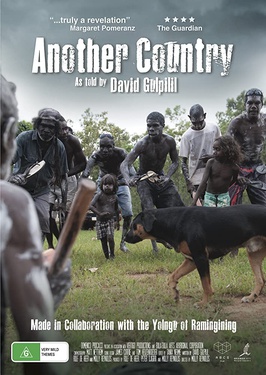Related Research Articles

David Dhalatnghu Gulpilil was an Australian actor and dancer. He was known for his roles in the films Walkabout (1971), Storm Boy (1976), The Last Wave (1977), Crocodile Dundee (1986), Rabbit-Proof Fence and The Tracker, and Australia (2008).

The Australian Academy of Cinema and Television Arts Awards, known as the AACTA Awards, are presented annually by the Australian Academy of Cinema and Television Arts (AACTA). The awards recognise excellence in the film and television industry, both locally and internationally, including the producers, directors, actors, writers, and cinematographers. It is the most prestigious awards ceremony for the Australian film and television industry. They are generally considered to be the Australian counterpart of the Academy Awards for the United States and the BAFTA Awards for the United Kingdom.

Aaron Pedersen is an Aboriginal Australian television and film actor. He is known for many film and television roles, in particular as Detective Jay Swan in the film Mystery Road (2013), its sequel Goldstone (2016), and spin-off television series (2018–2020). He has been nominated for many and won several acting awards, including the 2021 AACTA Award for International Award for Best Actor in a Series.

Nial William Fulton is an Australian film and television director, producer and writer. Focused on social justice issues, his works include investigative documentaries Revelation, Hitting Home, Borderland, The Queen & Zak Grieve and Firestarter: The Story of Bangarra.
Adam Zwar is an Australian actor, voice artist, and writer. He is best known for co-creating the Australian comedy series Squinters, Lowdown, Wilfred and creating the critically acclaimed Channel 10 comedy Mr. Black as well as the popular factual series Agony Aunts, Agony Uncles, The Agony of Life, The Agony of Modern Manners and Agony. Zwar also presented and produced seminal cricket documentaries Underarm: The Ball That Changed Cricket and Bodyline: The Ultimate Test which took a forensic look at the infamous 1932–1933 Ashes series between Australia and England.
The Longford Lyell Award is a lifetime achievement award presented by the Australian Academy of Cinema and Television Arts (AACTA), a non-profit organisation whose aim is "to identify, award, promote and celebrate Australia's greatest achievements in film and television." The award is presented at the annual AACTA Awards, which hand out accolades for technical achievements in feature film, television, documentaries and short films. From 1968 to 2010, the award was presented by the Australian Film Institute (AFI), the Academy's parent organisation, at the annual Australian Film Institute Awards. When the AFI launched the Academy in 2011, it changed the annual ceremony to the AACTA Awards, with the current award being a continuum of the AFI Raymond Longford Award.

Rachel Perkins is an Indigenous Australian film and television director, producer, and screenwriter. She founded and was co-director of the independent film production company Blackfella Films from 1992 until 2022. Perkins and the company were responsible for producing First Australians (2008), an award-winning documentary series that remains the highest-selling educational title in Australia, and which Perkins regards as her most important work. She directed the films Radiance (1998), One Night the Moon (2001), Bran Nue Dae (2009), the courtroom drama telemovie Mabo (2012), and Jasper Jones (2017). The acclaimed television drama series Redfern Now was made by Blackfella Films, and Perkins directed two episodes as well as the feature-length conclusion to the series, Promise Me (2015).

Warwick Thornton is an Australian film director, screenwriter, and cinematographer. His debut feature film Samson and Delilah won the Caméra d'Or at the 2009 Cannes Film Festival and the award for Best Film at the Asia Pacific Screen Awards. He also won the Asia Pacific Screen Award for Best Film in 2017 for Sweet Country.
The Inaugural Australian Academy of Cinema and Television Arts Awards, known more commonly as the AACTA Awards, presented by the Australian Academy of Cinema and Television Arts (AACTA), honoured the best Australian and foreign films of 2011 took place on two separate events, in Sydney, New South Wales: the AACTA Awards Luncheon, on 15 January 2012, at the Westin Hotel, and the AACTA Awards Ceremony, on 31 January 2012, at the Sydney Opera House. Following the establishment of the Australian Academy of Cinema and Television Arts, by the Australian Film Institute (AFI), these awards marked the inauguration of the AACTA Awards, but served as a continuum to the AFI Awards, which were presented by the AFI since 1958. The ceremony was televised on the Nine Network.
The 22nd Australian Film Institute Awards ceremony, presented by the Australian Film Institute (AFI), honoured the best Australian feature films of 1980, and took place on 17 September 1980 at Regent Theatre, in Sydney, New South Wales. The ceremony was hosted by Graham Kennedy and televised in Australia on ABC.

Matteo Zingales is an Australian film music composer who has won the AACTA Award for Best Original Score for a Feature Film for two years running. In 2013, he shared the award with Jono Ma for Best Score for Not Suitable for Children (2012), and in 2012, Zingales, Michael Lira and Andrew Lancaster shared the award for Best Score for The Hunter (2011).
The 3rd Australian Academy of Cinema and Television Arts International Awards, were presented by the Australian Academy of Cinema and Television Arts (AACTA), a non-profit organisation whose aim is to identify, award, promote and celebrate Australia's greatest achievements in film and television. Awards were handed out for the best films of 2013 regardless of geography, and are the international counterpart to the awards for Australian films. The ceremony took place at Sunset Marquis in Los Angeles, California on 10 January 2014 and will be televised in Australia on 12 January on the Arena network.
The 4th Australian Academy of Cinema and Television Arts Awards are a series of awards which includes the 4th AACTA Awards Luncheon, the 4th AACTA Awards ceremony and the 4th AACTA International Awards. The former two events will be held at The Star Event Centre, in Sydney, New South Wales in late January 2015. Presented by the Australian Academy of Cinema and Television Arts (AACTA), the awards will celebrate the best in Australian feature film, television, documentary and short film productions of 2014. The AACTA Awards ceremony will be televised on Network Ten for the third year running. The 4th AACTA Awards are a continuum of the Australian Film Institute Awards, established in 1958 and presented until 2010 after which it was rebranded the AACTA Awards when the Australian Film Institute (AFI) established AACTA in 2011.
Antony Michael Partos is an Australian film and TV composer. He specialises in creating scores that blend both acoustic and electronic elements with a mix of world musical instruments. His feature film credits include Animal KingdomThe Rover, Disgrace, The Home Song Stories and Unfinished Sky.

Another Country is a 2015 documentary film about the intersection of traditional Australian Aboriginal culture and modern Australian culture. It features actor David Gulpilil narrating a story about his home community of Ramininging in the Northern Territory.
Beck Cole is an Australian filmmaker of the Warramungu and Luritja nations. She is known for her work on numerous TV series, including First Australians, Grace Beside Me, Black Comedy and Wentworth, as well as documentaries and short films. She is based in Alice Springs, in the Northern Territory.
Danielle MacLean is an Australian filmmaker. She is known for her writing on television series such as Little J & Big Cuz, 8MMM Aboriginal Radio and Redfern Now.
Jonathan Brough is a New Zealand-born film director based in Australia. He is best known for the comedy TV series Rosehaven, Aftertaste and The Family Law.

Aquarius Films is an independent Australian film and TV production company based in Sydney, founded in 2008 by producers Angie Fielder and Polly Staniford. TV credits include Love Me, The Unusual Suspects, The Other Guy and Savage River Film credits include Academy Award and Golden Globe nominated Lion starring Dev Patel and Nicole Kidman, produced by Aquarius in association with See-Saw Films and the psychological thriller Berlin Syndrome starring Teresa Palmer and Directed by Cate Shortland which premiered at Sundance Film Festival, Dirt Music, directed by Gregor Jordan and starring Garrett Hedlund, Kelly Macdonald and David Wenham and Wish You Were Here, starring Joel Edgerton and Teresa Palmer, which premiered at Sundance Film Festival and won two Australian Academy of Cinema and Television Arts (AACTA) Awards, including Best Screenplay, and five Film Critics Circle Awards, including Best Film.
David Jowsey is an Australian film producer, co-founder of Bunya Productions. He is known for producing many films made by Indigenous Australian filmmakers. Bunya Productions' co-owners are Indigenous filmmaker Ivan Sen, and Jowsey's wife Greer Simpkin.
References
- 1 2 3 4 5 6 7 8 9 10 McGregor, Steven (1 September 2011). "Guestroom - Steven McGregor" (Audio). ABC Local (Interview). The Guestroom. Interviewed by O'Toole, Kate. Australian Broadcasting Corporation.
- 1 2 3 4 5 "Steve McGregor Award for Best Emerging Talent in Film/Television". First Nations Media Australia. Retrieved 15 July 2022.
- ↑ "Steven McGregor - The Screen Guide". Screen Australia. 16 March 2018. Retrieved 15 July 2022.
- ↑ "My Brother Vinnie (2006) - The Screen Guide". Screen Australia . 16 March 2018. Retrieved 15 July 2022.
- ↑ My Brother Vinnie (2006) on YouTube (28 mins) VJM, 7 Feb 2017.
- ↑ "Video Overview My Brother Vinnie (2006)". Australian Screen Online . National Film and Sound Archive . Retrieved 15 July 2022.
- ↑ Croker Island Exodus at IMDb
- 1 2 3 McGregor, Steven (2016). "Interview with Steven McGregor: Servant or Slave". Screen NSW (Interview). Retrieved 15 July 2022.
- ↑ "Servant or Slave". SBS On Demand . 30 September 2021. Retrieved 15 July 2022.
- 1 2 "Servant or Slave - Documentary Film". Watch Online. 5 August 2016. Retrieved 15 July 2022.
- ↑ "Servant or Slave". Antenna Documentary Film Festival . Retrieved 15 July 2022.
- ↑ "Indigenous storytelling – their territory". Ausfilm. 20 October 2021. Retrieved 15 July 2022.
- ↑ Slatter, Sean (17 July 2024). "Netflix turns 'Desert King' into 'Territory' with Anna Torv leading the cast". IF Magazine . Retrieved 25 July 2024.
- 1 2 3 4 5 "Steven McGregor". Asia Pacific Screen Awards. 5 October 2017. Retrieved 15 July 2022.
- ↑ "Winners & Nominees". AACTA . Retrieved 15 July 2022.
- ↑ "Screenwriters Steve McGregor and David Tranter win RAKA Prize". Newsroom. University of Melbourne. 9 September 2019. Retrieved 15 July 2022.
- 1 2 3 4 5 "Steven McGregor". AustLit . Retrieved 15 July 2022.